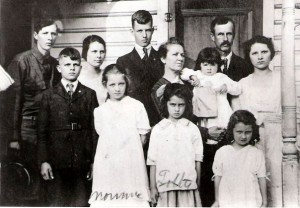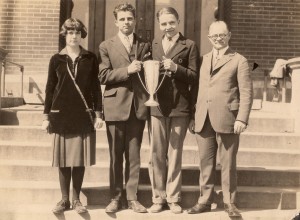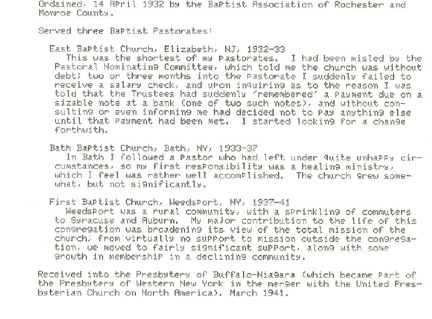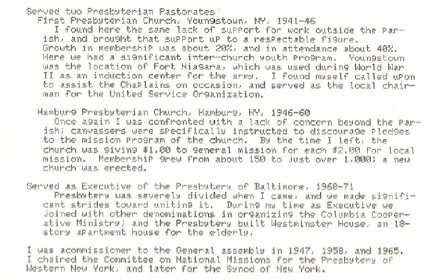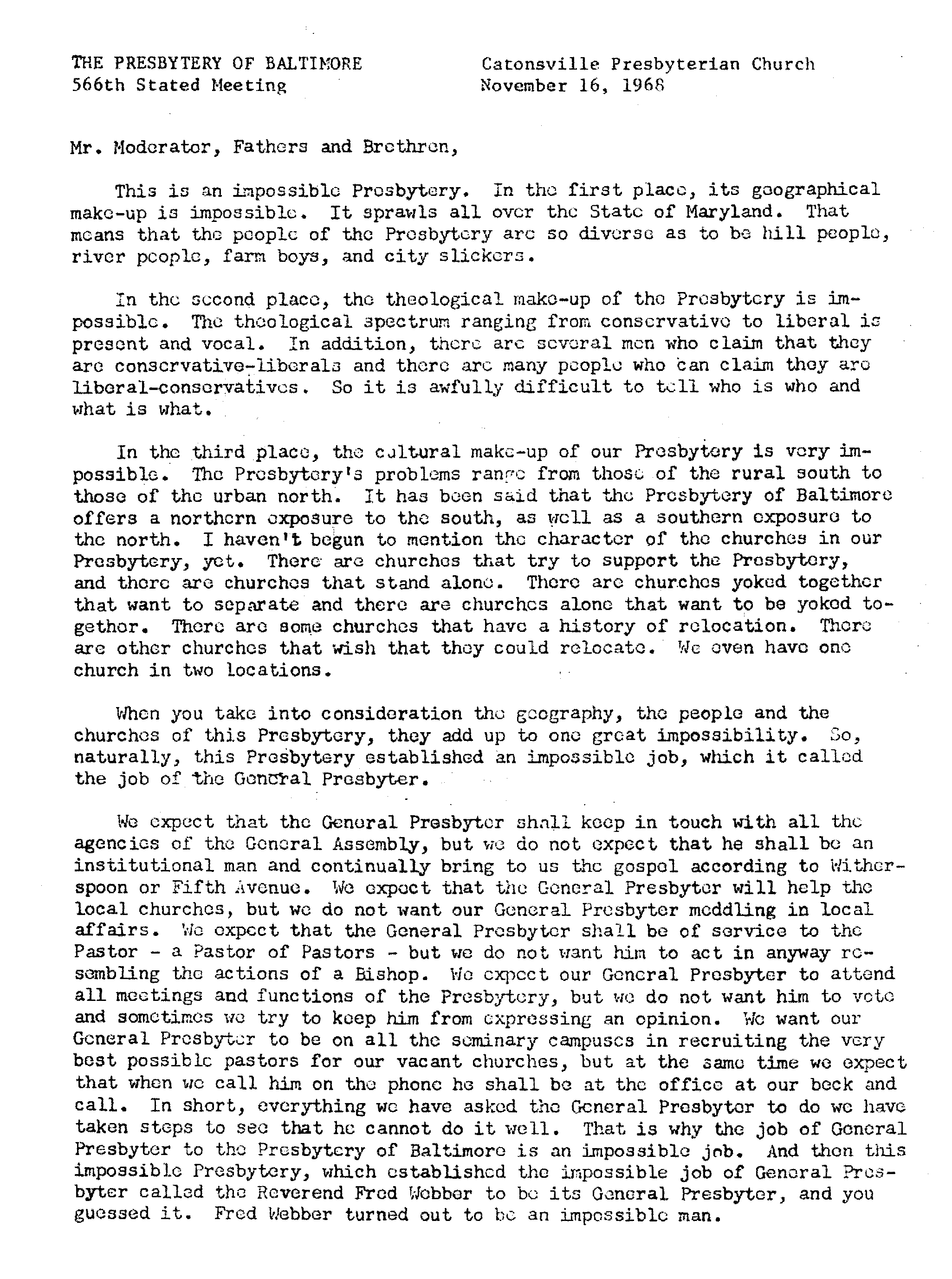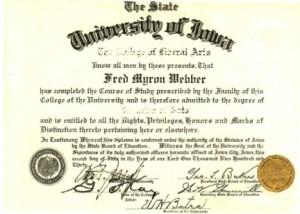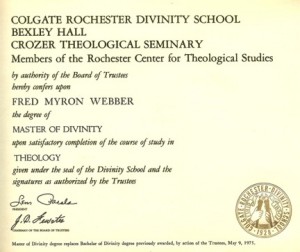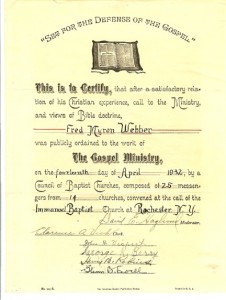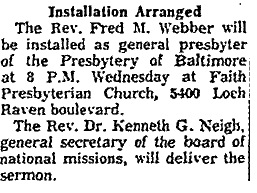 On Wednesday, September 28, 1960, the Rev. Fred M. Webber was installed as General Presbyter of the Presbytery of Baltimore. He remained in this position until his “retirement” in 1971. The installation took place at Faith Presbyterian Church in Baltimore, Maryland.
On Wednesday, September 28, 1960, the Rev. Fred M. Webber was installed as General Presbyter of the Presbytery of Baltimore. He remained in this position until his “retirement” in 1971. The installation took place at Faith Presbyterian Church in Baltimore, Maryland.
I’ve been digging around to learn more about my great uncle Fred and his involvement in the civil rights and ecumenical movements during the 1960s. To provide some background I’m considering these questions:
What did this move and new job mean for Fred Webber and his family?
What does a General Presbyter do?
What prepared him for this position?
Although I can’t really know what this new job and move meant to the Fred Webber family, I can imagine that Fred viewed it as a great opportunity. His wife, Carol, had been through several moves and job changes by this time – all part of the life of a minister. Three of Fred’s and Carol’s children were grown and on their own, so they were unaffected by the move from Hamburg, New York, to Baltimore, Maryland. However their youngest daughter, a Junior in high school, was “very angry (very, very, very angry)” with her father for moving before she finished high school and she did not make the move with her parents. Instead, Bea lived with the school librarian and her husband (members of Hamburg Presbyterian Church where Fred had been the minister), until the end of 11th grade. Happily, Bea reports that “the minister and his wife at the Catonsville Presbyterian Church (in Maryland), where Mother joined, had a daughter my age and she very graciously welcomed me that summer before our senior year. She met me on the way to school the first day and walked with me. After that, I found my own way and had a fabulous year, so I forgave my father.”
What does a General Presbyter do?
In my search for a job description, I found this one by The Rev. Dr. Kevin Yoho, General Presbyter of the Newark Presbytery: “As General Presbyter, I support and direct the work of the staff, provide guidance to the Mission Council, committees, and teams of the presbytery, represent and link the presbytery to educational, civic, and private institutions. I also serve as a pastor to the pastors and am available to offer confidential support, coach, and pray with our pastoral leaders.
Many conversations emerge with opportunities for partnering with congregations seeking and changing pastoral leadership; supporting congregational leaders feeling the pain of transitions, stress, and conflict that comes from growth and transformation; encouraging congregations in their discernment and pursuit of their missional identity; offering leadership in the Synod and national Presbyterian Church, and fostering denominational, ecumenical, and interfaith relationships….
Building trust, celebrating growth, fostering discernment through appreciative inquiry, inviting collaboration, clarifying ministry, assessing wellness and effectiveness, offering guidance, leading presbytery staff; these are the kinds of activities that I hope add value to the entire presbytery as it helps every pastor and session fulfill their unique mission in the world.”
That last paragraph fits my imaginings of how Fred envisioned his role as General Presbyter.
What prepared Fred for his new job as General Presbyter and his involvement in the civil rights and ecumenical movements?
Fred M. Webber was born to Dorinda Strange and M. D. Webber in 1906, the fifth of nine children. He was a younger brother of my grandmother Abbie. His father, M. D. Webber, served as a pastor in several small churches, although he eventually gave up the ministry in order to support his large family. Nevertheless, the practice of their Christian faith was a given in Fred’s family of origin.
Fred was an avid reader and enjoyed debate. He was named “Best Debater in the State of Iowa in 1926.” He graduated from The State University of Iowa in 1930 and later earned a Master of Divinity from Colgate-Rochester Theological Seminary in Rochester, New York. Fred began his ministry as a Baptist pastor in 1932, but was received into the Presbytery of Buffalo-Niagra in 1941 and served several churches in New York.
In a resume written around 1974, Fred summarized a few of his professional duties and accomplishments prior to his position as General Presbyter. It’s a little difficult to read, so I’ve typed in the highlights below.
* In Bath I followed a Pastor who had left under quite unhappy circumstances, so my first responsibility was a healing ministry, which I feel was rather well accomplished.
* (Weedsport) My major contribution to the life of this congregation was broadening its view of the total mission of the church; from virtually no support of mission outside the congregation, we moved to fairly significant support
* (Youngstown) I found here the same lack of support outside the parish, and brought that support up to a respectable figure. Growth in membership was about 20%, and in attendance about 40%
* (Hamburg) Once again I was confronted with a lack of concern beyond the parish … By the time I left, the church was giving $1.00 to general mission for every $2.00 for local mission. Membership grew from about 150 to over 1,000; a new church was erected.
* Fred was commissioner to the General Assembly in 1947, 1958 and again in 1965.
It does appear that these were valuable experiences that Fred could apply to his job as General Presbyter. In the resume above, he says the following about his work in the presbytery: Presbytery was severely divided when I came, and we made significant strides toward uniting it.
In addition to the experiences listed above, Fred was known as having a “can do” attitude as exemplified by his favorite saying, “If you can read, you can do anything.”
Among the files sent to me by Fred’s daughter, Bea, is a humorous letter written in 1968 addressing the Presbytery of Baltimore at the 566th Stated Meeting. The letter was submitted by the congregation at Catonsville and speaks of Fred as an impossible man in an impossible job in an impossible place.
An additional question I have is what influenced Fred’s involvement in the civil rights movement. I haven’t read any of Fred’s sermons, so I don’t know if, when, or how often he preached on the issue of civil rights, but it is obvious from his resume that Fred always pushed his congregations to look (and give) beyond the doors of their church. I asked family members to offer their thoughts regarding what influenced Fred’s commitment to civil rights:
Anyone care to speculate what his early life and family experience played based on what you heard from Fred or what you heard about or experienced yourself in the home of Dorinda and M. D. Webber? Or maybe it was time spent in seminary, as a pastor?
I received the following responses:
* I think his civil rights position came from his Christian principles. I think civil rights became a big issue after he had a congregation.
* Bea found a 1920s prayers for social justice book in all the things she went through last year, so I think his convictions surely came from his full life experiences.
* One of our grandmother’s (Dorinda Strange Webber) brothers was killed by an Indian before she was born. She talked about that fact fairly often, but I never heard one negative word about that particular Indian or about Indians in general. I think that the Webber family was not into racial, ethnic bigotry at all. God made and loved each human being, no matter color, etc. I think that would have had an impact on anyone who lived with them – especially those who grew up with them.
To add a little more context, I did just a smidgen of research on the Rev. Dr. Kenneth G. Neigh, who gave the sermon at Fred Webber’s installation. Mr. Neigh was the general secretary of the Board of National Missions, a position he held from 1959-1972.
In 1996, the New York Times published an obituary for Kenneth Neigh calling him “a national Presbyterian church official who put the church in the forefront of the civil rights movement and broadened its commitment to social causes in the 1960s.” It continues – “For a man who was less than five and a half feet tall and had an uncommonly soft voice, Mr. Neigh wielded a lot of power from his office on Riverside Drive, then the headquarters of the United Presbyterian Church in the United States….. Although he had official power only within his own church, Mr. Neigh’s pioneering approach was credited with influencing similar efforts in other churches, especially after his friend and admirer, Eugene Carson Blake, the Presbyterian Church’s top ecclesiastical official, carried Mr. Neigh’s vision with him when he became head of the National Council of Churches and later of the World Council of Churches.”
If you would like to read more about Fred M. Webber, click the Fred Myron Webber tag/link at the bottom of this post.

